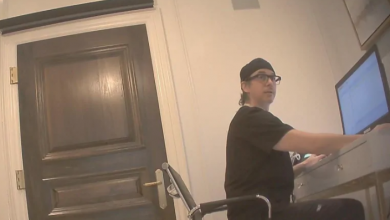Plastic surgeon filmed patients without consent, class-action lawsuit alleges
A Toronto plastic surgeon could face a class-action lawsuit over allegations that he breached the privacy rights of patients by recording them — sometimes in a state of undress — without their consent using surveillance cameras inside his clinic.
Dr. Martin Jugenburg — known online as Dr. 6ix — is well-known on social media and was the focus of a Marketplace investigation last year that found security cameras in examination rooms at his clinic in the Fairmont Royal York hotel.
The lawsuit, which was filed on behalf of former patients Thursday afternoon in Ontario Superior Court of Justice, alleges that Jugenburg failed to act in the class members’ best interests and that he placed his interests over theirs “in pursuit of his own personal and commercial gain.”
J.C., a representative plaintiff in the case, went to Jugenburg’s clinic for a breast lift consultation and said the behaviour alleged in the lawsuit is unacceptable.
“I can’t imagine how many other women out there don’t even know this has gone on. No doctor should be able to get away with this type of behaviour.”
The statement of claim also alleges that Jugenburg’s clinic posted images of patients on social media without their consent. The allegations have not been proven in court.
If given the go-ahead by a judge, the class-action could represent patients who visited Jugenburg’s clinic, the Toronto Cosmetic Surgery Institute, between January 2012 and February 2019.
“The heart of the lawsuit is really to get damages for women who had their trust abused by Dr. Jugenburg and who suffered some pretty serious mental health effects as a result of realizing that they were filmed without their consent,” said Tina Yang, one of the lawyers involved in the case.
The plaintiffs are seeking $50 million in damages, including aggravated damages, and $25 million in punitive damages, plus an amount to be determined for special damages. Lawyers say these numbers could change if the lawsuit is certified, the number of plaintiffs in the class is determined and their additional experiences are gathered.
Last year, while reporting undercover for a story on breast implants, Marketplace producers spotted security cameras in a closed-door examination room where patients are asked to undress, as well as in the waiting area. The small black-and-white devices were attached to the ceiling in the corners of the rooms. At least some of the cameras in these rooms were also recording audio.
Following CBC’s coverage, Jugenburg said in an email that he provided clear signs about security cameras and removed the cameras from examination rooms.
‘It wasn’t private’
J.C., one of two representative plaintiffs on the statement of claim, had read Marketplace’s article last year.
“I remember I was walking through my basement reading it and then I … literally fell onto the chair and I was overcome with humiliation.”
J.C. visited Jugenburg’s clinic in the summer of 2018. She said a nurse asked her to remove her top and bra so that photos of her breasts could be taken for her medical record with a hand-held camera, which is common practice.
At one point, J.C. also took off her pants so the nurse could examine her for a “tummy tuck.” J.C said that at no point during her consultation did staff tell her about the additional security cameras in the room.
“The entire time I was there, it wasn’t private,” she said, noting that at one point during the consultation, the nurse left the room to give J.C. and her friend who accompanied her to the appointment a moment to discuss their thoughts.
“That private conversation for starters wasn’t private,” she alleges. “But [the nurse] knew it wasn’t private.”
Footage live on doctor’s phone
Both Ontario’s Information and Privacy Commissioner (IPC) and the College of Physicians and Surgeons of Ontario (CPSO) launched investigations into Jugenburg’s clinic following Marketplace’s reports in December 2018.
The commissioner’s investigation found that the clinic’s use of security cameras went against Ontario’s Personal Health Information Protection Act and that the clinic did not obtain patients’ consent to film them with security cameras during appointments.
The commissioner reported that the clinic had a network of 24 security cameras that were recording 24 hours a day in examination rooms, the operating room, pre-operative room, reception areas, hallways, administrative offices, a computer workroom and the staff kitchen.
According to the commissioner’s report, some cameras were first installed in 2012 but stopped working sometime that year. When the clinic expanded to two floors, the system was reset. These recordings began running in January 2017. The clinic said it shut off the cameras on Dec. 13, 2018.
The footage was available for Jugenburg to view live through a secure application on his phone. Footage from the security cameras was also stored on devices that were automatically overwritten with new footage approximately every 30 days, the report said.
Jugenburg told the IPC that the cameras were installed for the security of the clinic, staff and patients and not for health-care purposes.
As part of the investigation, the clinic gave the IPC examples of when footage from the surveillance cameras was reviewed by staff. On two occasions, the footage was reviewed to verify statements made by staff to patients during consultations and on another occasion to review staff conduct.
In the spring of 2019, the college told Jugenburg to remove all cameras from rooms where patients undress and required that the clinic post clear signage alerting visitors to video surveillance.
CBC






Redes Sociais - Comentários